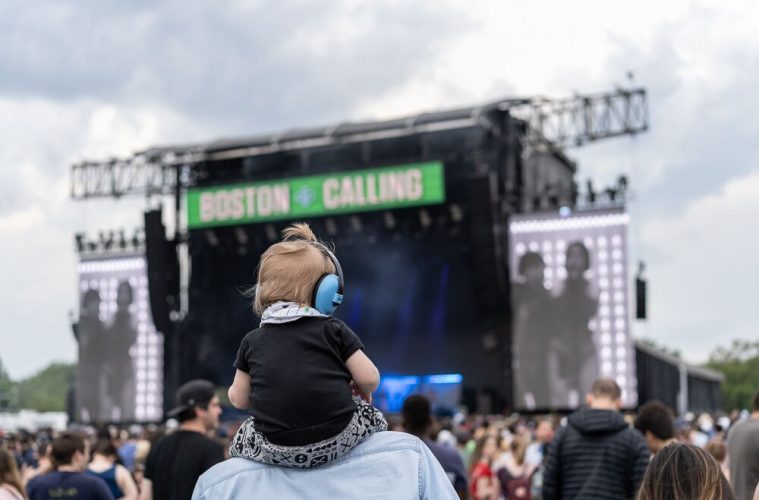If Boston Calling 2018 is to be remembered for any reason, that reason will be either one of the following: Characteristically fickle New England weather, or male headliners getting outshone by the festival’s slate of female supporting acts. Good as The Killers’ set at on the Green Stage was on Friday night, Paramore, playing the Blue Stage as one of the night’s final performances (the other being career dullards The National), was simply better, occupying a similar niche with unflagging vigor. Jack White’s theatrics dazzled on Saturday, supplementing his mad rock scientist vibe, but St. Vincent’s run-through of her 2017 release, Masseduction, presented just as much spectacle while making declarative statements about Annie Clark as an artist.
In a roundabout way, Eminem, who closed out the festival Sunday night, benefited from being preceded by two male (or at least predominantly male) acts, The Decemberists and Fleet Foxes; not being led into by performances by female semi-headliners lets him somewhat elide the conversation about the gender imbalances of this year’s lineup. (Emphasis on “somewhat.”) In the spirit of fairness, diversity is represented on the schedule, speaking to race, to genre, and to gender, but in keeping with that spirit “diversity” isn’t a gold star you award yourself for doing the bare minimum possible. Is the lineup, taken as a whole, diverse? Sure! Friday alone you could bounce from This is the Kit to Big Thief to Noname to Maggie Rogers to Portugal. The Man, then end the night with Paramore and The Killers.
But as you may surmise from the above, participating in that diversity means squeezing it all in across the lineup’s bottom portions. Maybe, to an extent, that’s okay. If you attended Saturday, you likely wandered from stage to stage, soaking in the many and varied styles of music, appreciating Boston Calling’s efforts at inclusion, and doing your damnedest to avoid falling to heat stroke. (Criticism of the lineup aside, everyone should agree that the festival was, all told, incredibly well run, blanketed by first aid stations, water stations, and, perhaps most important of all, food and drink vendors that didn’t go out of their way to gouge patrons.) But if you only bothered showing up at the end of the day, your view of the festival will be considerably more homogenized, and that’s a shame.
The good news is, you had a good time at Boston Calling anyways, and at the end of all things, that’s the point. So as to avoid further sucking the joy out of a fantastic weekend spent at the Harvard Athletic Complex, let’s move on to the best acts we saw out of this year’s fest:
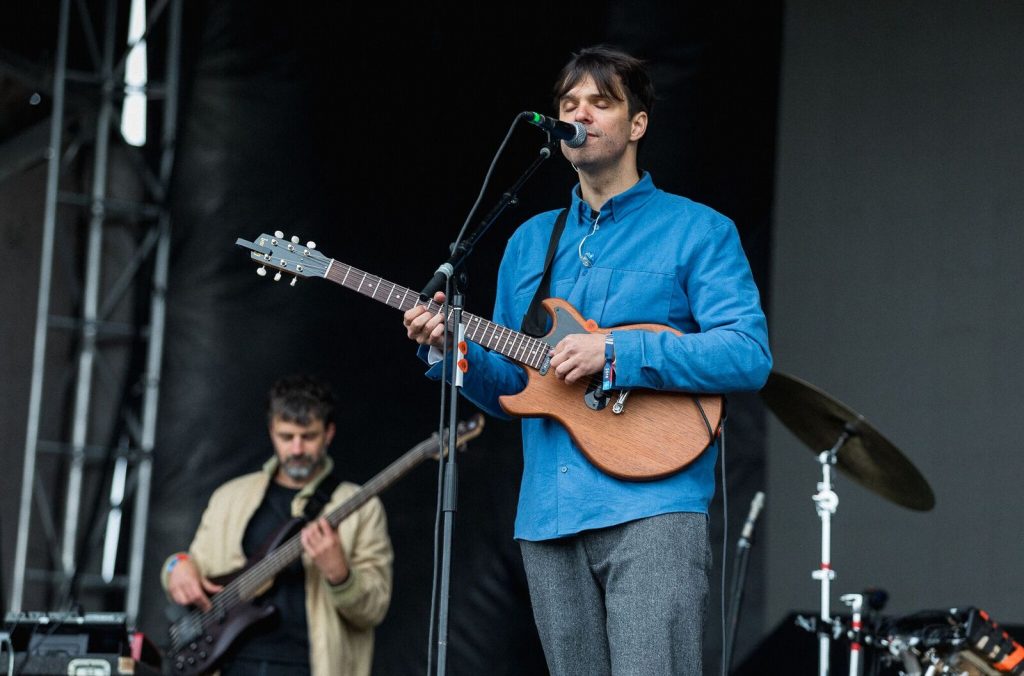
Dirty Projectors; photo by Ty Johnson.
Bonus: Dirty Projectors:
Enterprising indie rock band Dirty Projectors hopped on the Blue Stage on Sunday and encountered any musician’s worst nightmare in a live setting: Technical difficulties with their bass. Bereft of their low end, the gang soldiered forth, exuding noticeable discomfort at their circumstances. But then, a miracle: The bass rumbled through the speakers, giving the band its foundation, and in an instant, frontman David Longstreth led the rest of the crew in a set so confident we all forgot about their aural issues. That takes major poise, so kudos to the Dirty Projectors for the smooth recovery.
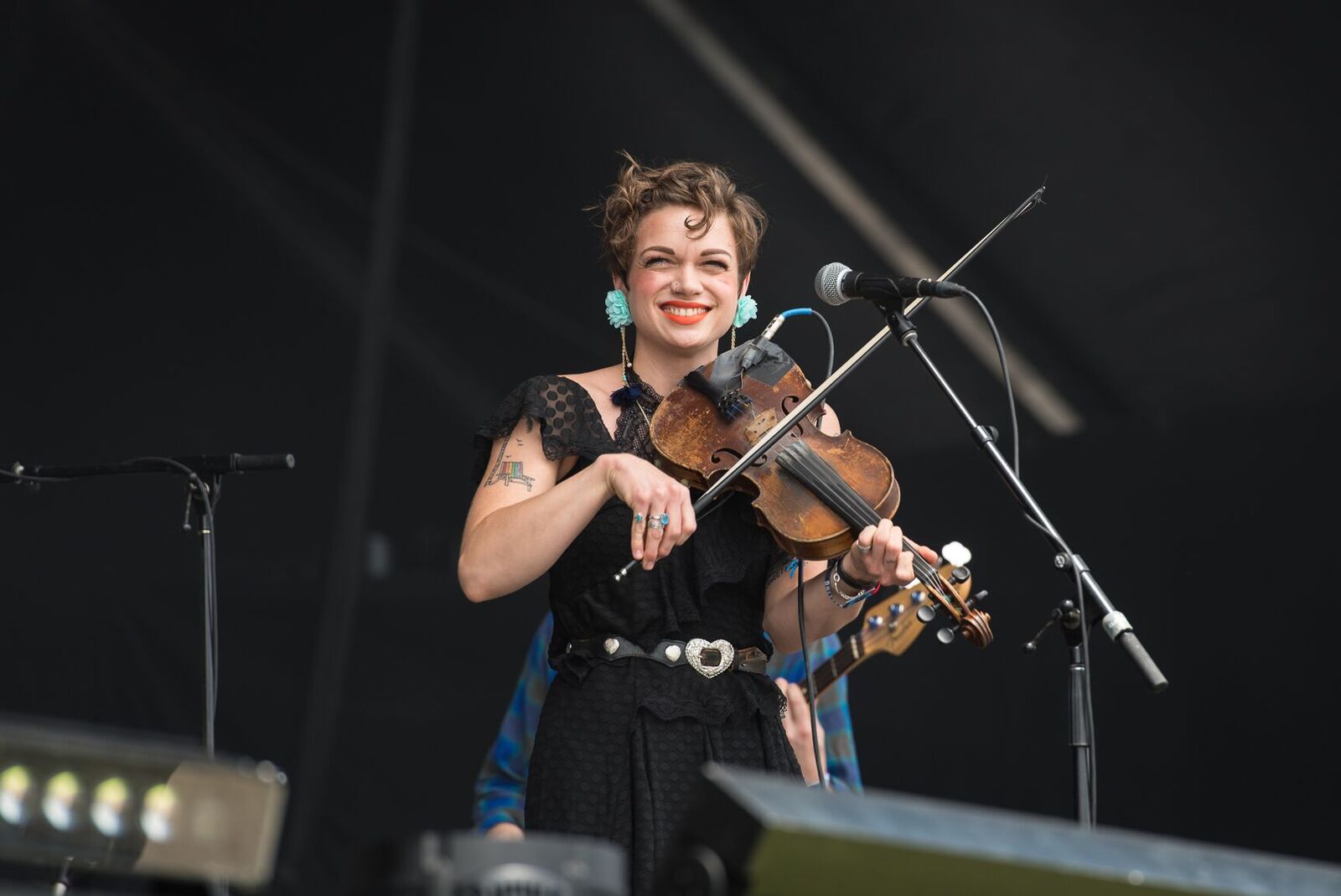
Lillie Mae; photo by Loreen Kelley Photo.
Lillie Mae:
You probably don’t picture a fiddle player in the same context as a lead guitarist, shredding their frets, dominating the stage, making themselves the focal point of the show as they stuff your ears with riffs and licks. Maybe you haven’t seen Lillie Mae Rische play the fiddle. Rische knows how to rock her instrument, and even if she doesn’t consider herself a bandleader, she knows how to direct her supporting musicians (including her brother, Frank Rische), which is a long-winded way of saying she’s eminently watchable and unbelievably gifted. All told, hers was the perfect set to attend on Saturday’s sunbaked afternoon. Country music and heat just fit.
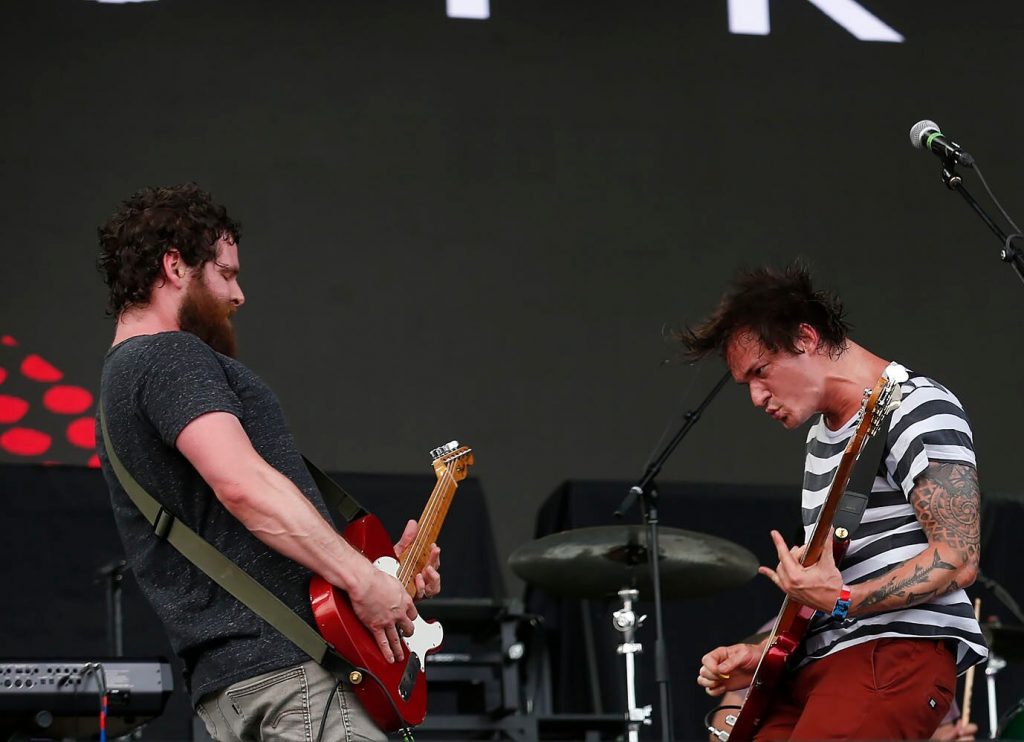
Manchester Orchestra; photo by Rebecca Taylor.
Manchester Orchestra:
From the “we’d never listened to this band until we saw them live” file, there’s Atlanta’s Manchester Orchestra, an indie rock outfit with a real gift for sonic layering. One moment: Melodic acoustic tunes. The next: Booming percussion buttressing earthshaking guitar chords. But there was harmony in the contrast, a throughline of urgent emotion sans any trace of immaturity. Five albums into their lifespan, Manchester Orchestra can’t really get away with juvenile kvetchings, but rather than “old man” rock, they play “grown up” rock. There’s a sophistication to the themes of their songs. On stage, that sophistication translated into a stripped-down set cemented by the band’s towering stage presence.
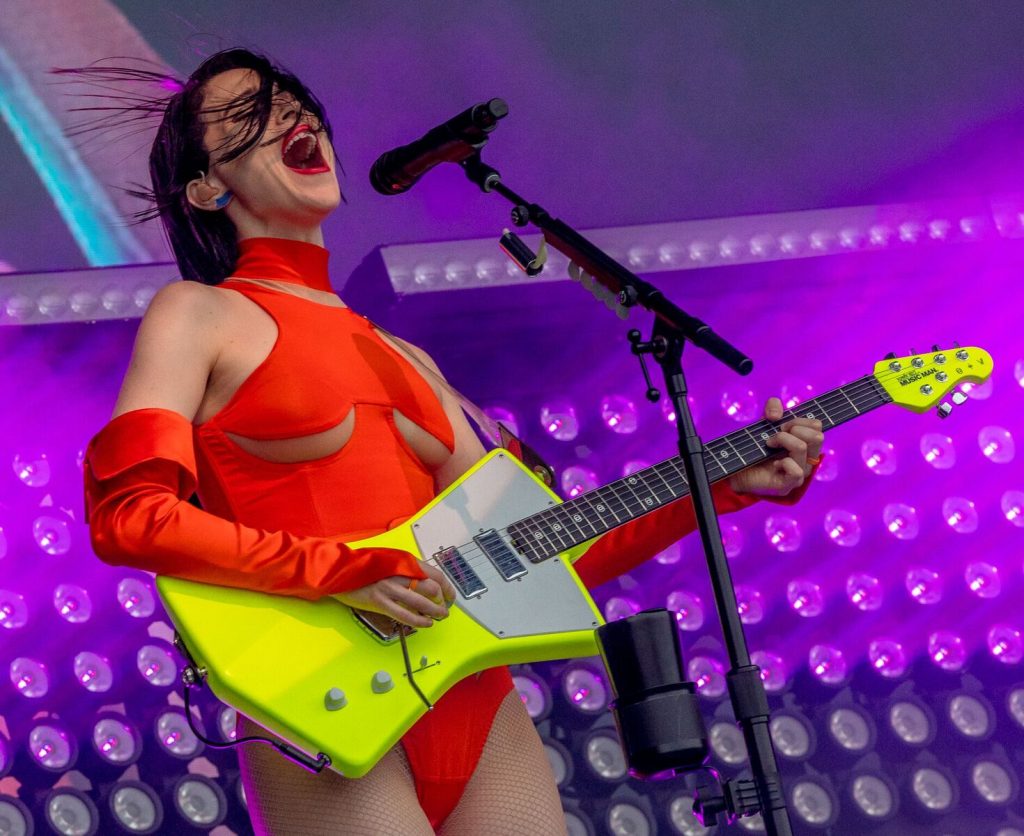
St. Vincent
St. Vincent:
The most memorable element of St. Vincent’s set might well be the bizarre short films playing on the monitors decorating the Green Stage; most of them featured Clark herself as the subject, treated to all manner of grotesque beauty treatments, with occasional asides where rotting fruit made up the focal point. If this whole “rock and roll queen” thing goes sour for Clark she can just try her hand at making movies (which, as of 2017’s anthology horror film XX, she’s already started doing). But of course, a St. Vincent performance is fundamentally about the marriage of classic rock and roll posturing with Clark’s aesthetic and her sexual self-possession. Hers was a set defined by steely empowerment more so than squirm-inducing gimmickry.
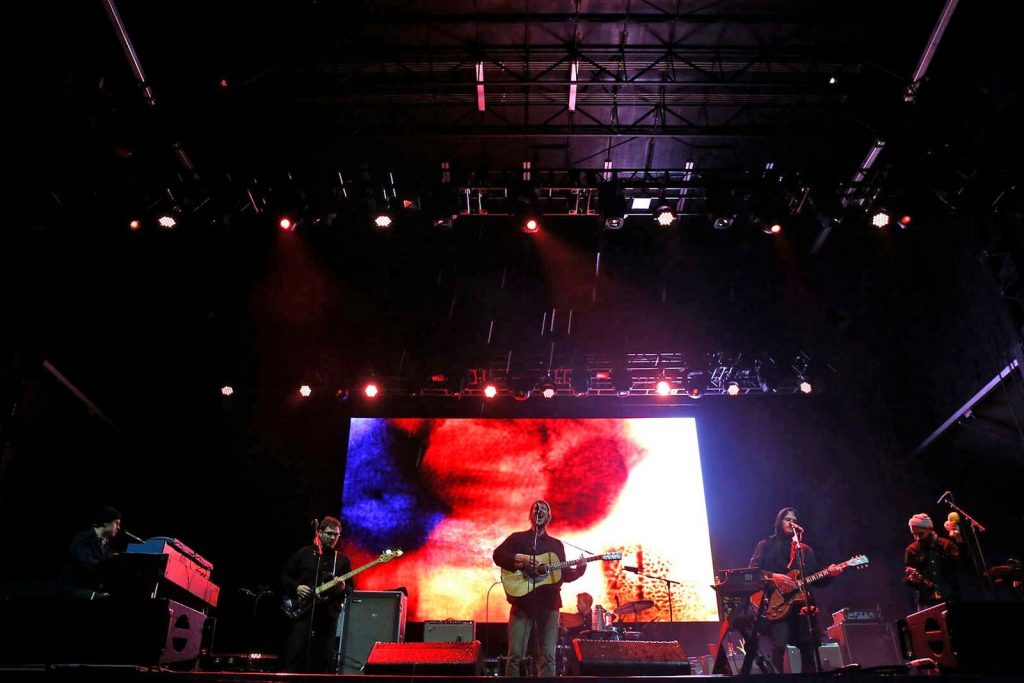
Fleet Foxes; photo by Carly Boyle.
Fleet Foxes:
If Robin Pecknold wasn’t such an inveterate jokester, the Fleet Foxes Sunday night set would have felt, perhaps, too formal. Not that formality’s a bad thing: The Foxes are consummate performers, not flashy, thoroughly professional, there to mesmerize you with their virtuosic skill, and with gorgeous lighting design. Humor is not what anyone would imagine as their strong suit. But Pecknold’s reserve belies his love of a good wisecrack, and so he spent time in between tracks talking Celtics with the crowd or addressing whichever audience members managed to get his attention. His personability brought much-needed warmth to the evening’s rain-soaked cold, and that, in tandem with the band’s absolutely exquisite musicianship, kept the crowd on their feet from start to finish for one of Boston Calling’s very best shows.
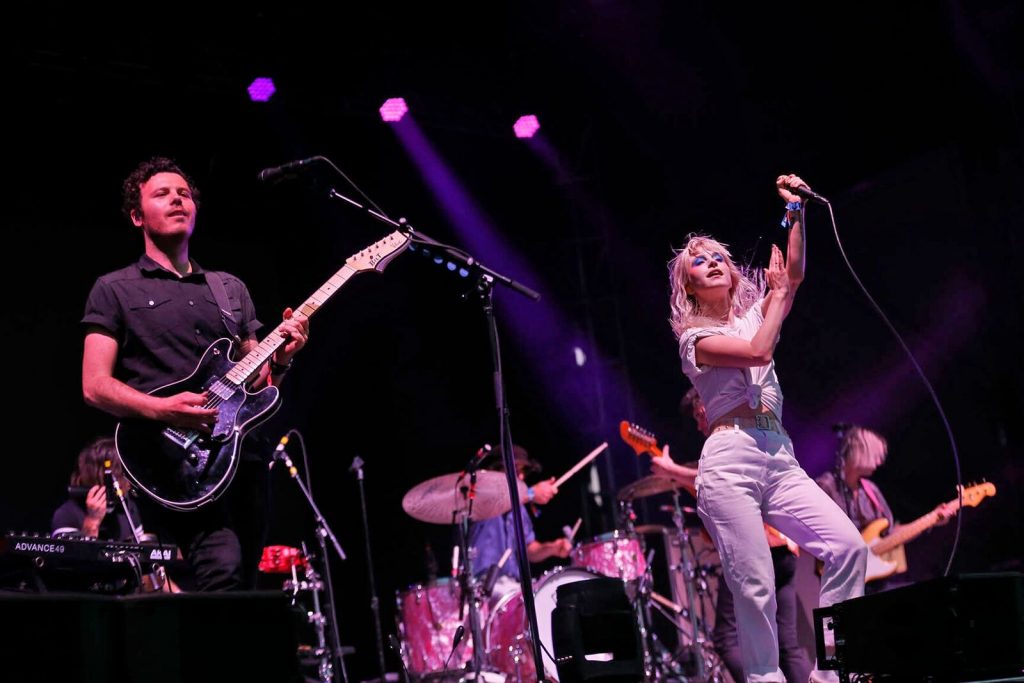
Paramore; photo by Carly Boyle.
Paramore:
Hayley Williams is a rock star. There’s no other way to describe her. For just about an hour, she vaulted, slid, and bounded about the Blue Stage, performing each song on the setlist with the same electric intensity as the last, never once hinting at fatigue or allowing her audience’s experience to slacken for even a beat. Williams has her own specific idea of what it means to perform, and that idea is you. She encouraged fans to join in singalongs without having to prompt them by point the mic at them, effortlessly ratcheting decibel levels around the Blue Stage to earsplitting for songs like “That’s What You Get.” If that isn’t the definition of showmanship, then there’s no such thing.

